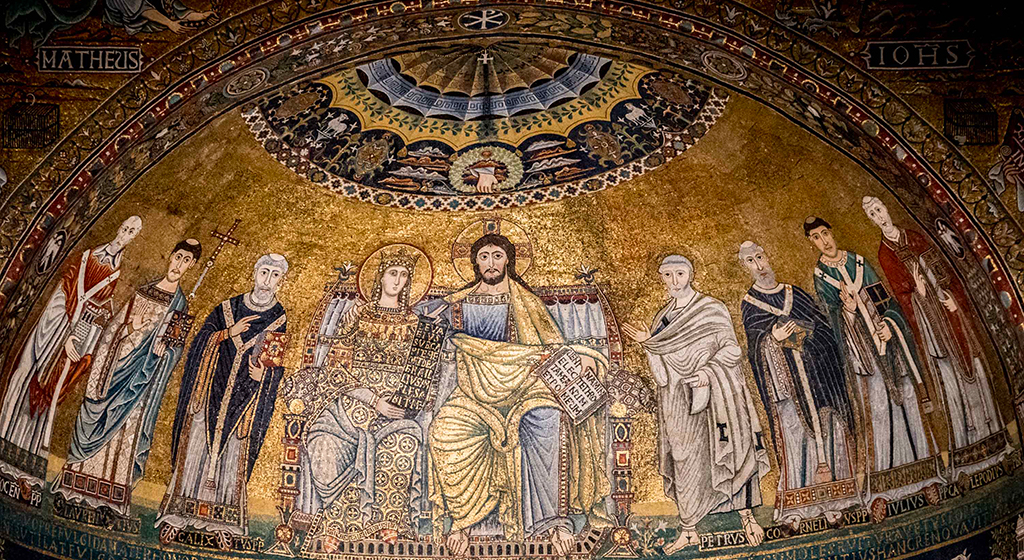Memory of the Church
Reading of the Word of God
Praise to you, o Lord, King of eternal glory
I am the good shepherd,
my sheep listen to my voice,
and they become
one flock and one fold.
.
Praise to you, o Lord, King of eternal glory
John 8,51-59
In all truth I tell you, whoever keeps my word will never see death. The Jews said, 'Now we know that you are possessed. Abraham is dead, and the prophets are dead, and yet you say, "Whoever keeps my word will never know the taste of death." Are you greater than our father Abraham, who is dead? The prophets are dead too. Who are you claiming to be?' Jesus answered: If I were to seek my own glory my glory would be worth nothing; in fact, my glory is conferred by the Father, by the one of whom you say, 'He is our God,' although you do not know him. But I know him, and if I were to say, 'I do not know him,' I should be a liar, as you yourselves are. But I do know him, and I keep his word. Your father Abraham rejoiced to think that he would see my Day; he saw it and was glad. The Jews then said, 'You are not fifty yet, and you have seen Abraham!' Jesus replied: In all truth I tell you, before Abraham ever was, I am. At this they picked up stones to throw at him; but Jesus hid himself and left the Temple.
Praise to you, o Lord, King of eternal glory
I give you a new commandment,
that you love one another.
Praise to you, o Lord, King of eternal glory
"Very truly, I tell you, whoever keeps my word will never see death." This statement that open today's Gospel passage speaks clearly of the liberating power of the Word of God. Jesus' insistence on the importance of listening to and observing the Gospel shows the disciples the way to be free from the many kinds of slavery of this world, including death. It is truly strange: while the Lord wants to give us "eternal" life (that does not end with death), we resist his words. Many people look with diffidence and hostility at the Lord's generous offer of a different life, one that is more human and meaningful. It is as if we are refusing this great love. Sometimes we would accept the Gospel, if it were only a little less demanding, if it would not disturb us too much, or if it would not ask us to change our lives and our habits too much. It is easy for us to join in the question asked by those who wanted to cast doubt on Jesus' authority: "Are you greater than Abraham?" Their point was to flatten the Gospel, to empty it of its power, and to lower it to normalcy. "Who do you think you are?", they asked him brazenly. Indeed, only God can conquer death. This is the Gospel, the good news, which Jesus came to bring into the world. If the Gospel loses its prophetic voice, if it stops being foreign to the world, if it does not point to the goal of heaven, it is as if we have killed it. Once again, Jesus responds by saying that he was not exalting himself. His words come from his direct knowledge of the Father who is in heaven. He is the one who sent him. And Jesus presents himself as the first one who listens and obeys. We could say that Jesus clearly professes his "faith" when he says: "If I were to say that I do not know him, I would be a liar like you. But I do know him, and I keep his word. Your ancestor Abraham rejoiced that he would see my day; he saw it and was glad." It is a reference to the vision God gave Abraham, which he accepted with joyful faith. Choosing to follow the Gospel requires us to stop living bent over ourselves and, with joy, to welcome God's vision, God's plan of love, which he wants us to participate in making real. If we close ourselves up in our selfishness, we will be like those listeners who first bitterly criticize Jesus and then pick up stones to throw at him. The stones are like our feelings and behaviours, which block the Gospel and its power. The Lord is looking for disciples who know how to listen to him and welcome the loving plan of the Father, who wants everyone to be saved.
